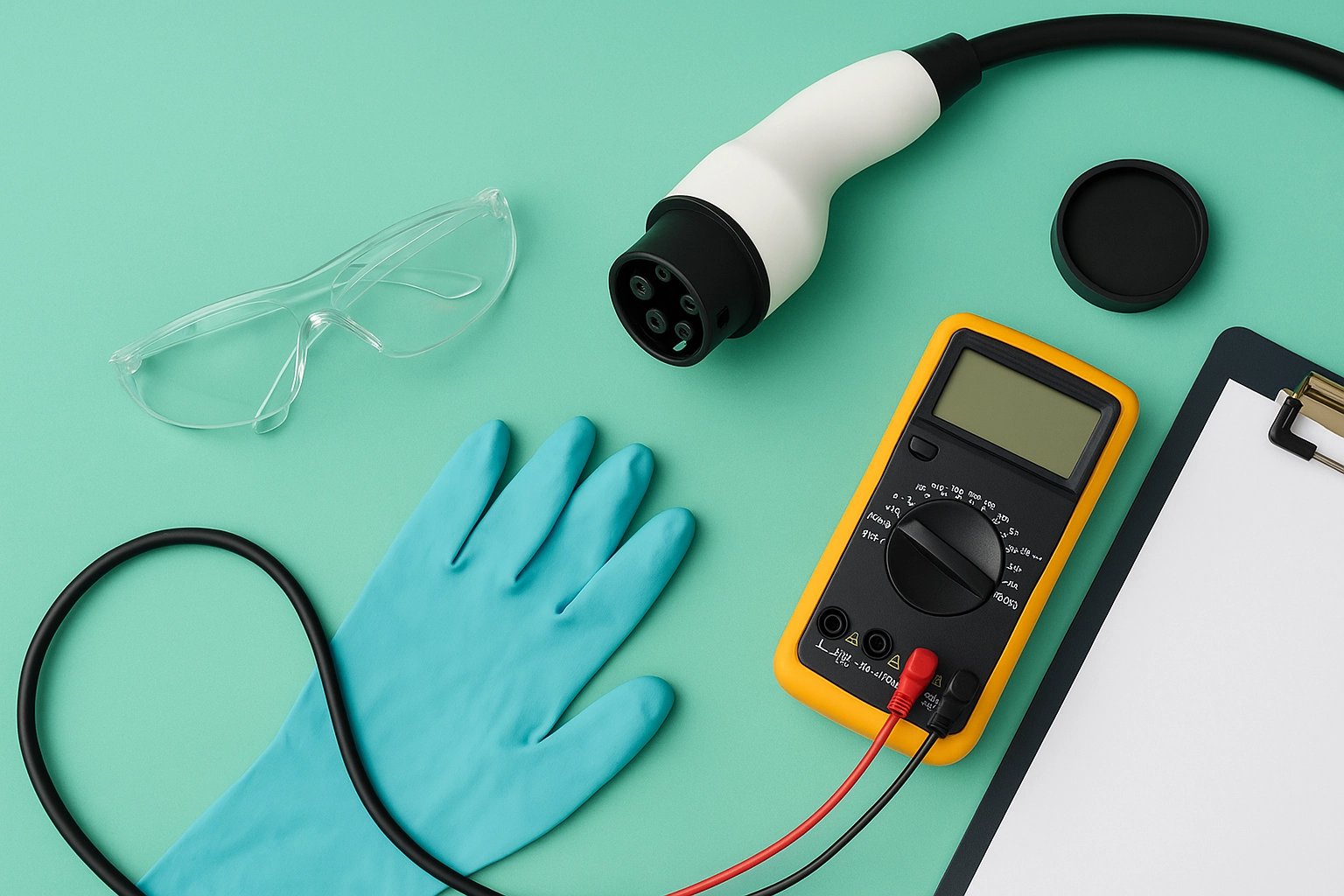IEC 62196 2 Type 2 AC Charging Connector Testing
The IEC 62196-2 standard specifies the technical requirements for the connectors used in Level 2 alternating current (AC) charging systems, which are critical for electric vehicles (EVs). This standard ensures interoperability, safety, and reliability of charging interfaces. The testing of these connectors is essential to guarantee compliance with international standards and to ensure that EV chargers function correctly under a wide range of conditions.
The Type 2 connector, also known as the "Europlug" or "CE-CONEC" connector, is widely used in Europe and other regions for AC charging. This connector design allows for both single-phase (1-phase) and three-phase (3-phase) power supply configurations, making it versatile for different types of EV chargers. The testing process involves a series of rigorous checks to ensure that the connectors meet all specified requirements.
The testing procedure typically includes mechanical durability tests, electrical performance checks, and environmental stress qualification tests. Mechanical durability tests assess the connector's resistance to wear and tear under repeated insertion and extraction cycles. Electrical performance checks focus on ensuring proper voltage transfer and preventing short circuits or other electrical hazards. Environmental stress qualification tests verify that the connectors can withstand harsh conditions such as temperature fluctuations, humidity, and dust.
For accurate testing, specialized equipment is required, including a test bench capable of simulating real-world charging scenarios. This equipment must be able to apply varying levels of current, voltage, and power factor to the connector under test. Additionally, the test setup should include sensors for measuring key parameters such as contact resistance, inductance, capacitance, and temperature.
The testing process also involves thorough inspection of the connector's physical features, including pin alignment, insulation distance, and creepage distance. These inspections are crucial to ensure that the connector meets all dimensional tolerances specified by IEC 62196-2. The use of advanced imaging techniques, such as optical microscopy or X-ray inspection, can provide detailed insights into the internal structure of the connector.
Once the tests are completed, a comprehensive report is generated detailing the results of each test parameter. This report serves as a critical document for quality assurance and compliance purposes, providing clear evidence that the connectors comply with international standards. The data in this report can also be used to identify any areas where improvements are needed in future designs.
In summary, IEC 62196-2 Type 2 AC Charging Connector Testing is a vital process for ensuring the safety and reliability of EV charging systems. By adhering to this standard, manufacturers can guarantee that their products meet all necessary requirements, thereby enhancing consumer confidence and promoting broader adoption of electric vehicles.
Why It Matters
The importance of IEC 62196-2 Type 2 AC Charging Connector Testing cannot be overstated. This testing ensures that EV chargers are safe, reliable, and interoperable across different manufacturers and regions. Compliance with this standard is crucial for several reasons:
- Enhanced Safety: Proper testing helps identify potential hazards such as short circuits or electrical malfunctions.
- Interoperability: Ensures that connectors from different manufacturers can work seamlessly together.
- Rapid Charging: Guarantees efficient power transfer, which is essential for fast charging applications.
- Longevity: By ensuring mechanical durability, the testing process helps extend the life of the connector and the associated EV charger.
The global shift towards electric vehicles has made this type of testing more critical than ever. As more countries adopt policies to encourage the use of renewable energy sources, such as solar power, the need for reliable and safe charging infrastructure grows exponentially.
Why Choose This Test
- Compliance with International Standards: Ensures that EV chargers meet the stringent requirements set by IEC 62196-2, thereby facilitating international trade and cooperation.
- Enhanced Safety: Identifies potential risks early in the development process, reducing the likelihood of accidents or malfunctions.
- Interoperability: Guarantees that connectors from different manufacturers can work together seamlessly, promoting a unified charging ecosystem.
- Rapid Charging: Ensures efficient power transfer, which is essential for fast charging applications and improving user experience.
- Longevity: By ensuring mechanical durability, the testing process helps extend the life of both the connector and the EV charger.
The benefits of choosing this test are clear: it ensures safety, interoperability, reliability, and efficiency. These advantages make IEC 62196-2 Type 2 AC Charging Connector Testing an indispensable part of any EV charger development or quality assurance program.
Use Cases and Application Examples
| Use Case | Description |
|---|---|
| Rapid Charging Stations | Ensures that charging stations can handle high-power loads safely and efficiently. |
| Corporate Fleets | Guarantees that EVs used in corporate fleets are fully charged and ready for use at all times. |
| Residential Charging Solutions | Provides peace of mind by ensuring that home chargers are safe and reliable. |
| Application Example | Description |
|---|---|
| Automotive Manufacturers | Facilitates the production of EVs that meet international safety standards and are interoperable with various charging networks. |
| EV Charging Network Operators | Ensures that their infrastructure is safe, reliable, and efficient for all users. |
The use cases for IEC 62196-2 Type 2 AC Charging Connector Testing are diverse and numerous. From rapid charging stations to corporate fleets and residential solutions, this testing plays a crucial role in ensuring the safety and reliability of EV chargers. For automotive manufacturers, it is an essential part of the quality assurance process, while for EV charging network operators, it ensures that their infrastructure meets international standards and operates smoothly.





